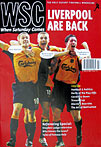 Sol Campbell's departure from Spurs calls into question the level of players' wages
Sol Campbell's departure from Spurs calls into question the level of players' wages
In the last week of May, the golfer Andrew Oldcorn collected more than £300,000 for winning the Volvo PGA tournament at Wentworth. Not a bad return for four days’ work by anyone’s standards, but few in the press were lining up to savage the mild-mannered Oldcorn for his rampant avarice. No matter how he performs on the tour this year, he will not be greeted on the tees of Europe by snarling fans chanting that there is “only one greedy bastard”.
The same cannot be said for Sol Campbell, whose decision to leave Tottenham (destination unknown at the time of going to press) sparked outrage from the club and condemnation from some newspaper columnists. Tottenham’s new vice-chairman David Buchler, by no means poverty-stricken himself, branded Campbell’s alleged demands “obscene”.
He was vehemently backed up in the Sun by Jimmy Greaves, who described Campbell as “a greedy, average performer”. Greaves claimed he himself moved to Tottenham from Milan in 1961 even though Chelsea offered him double the wages. “I went to Tottenham for the greater challenge,” he says (which is another way of saying that Spurs were more likely to win trophies). Greaves repeats the same story in his famous autobiography, This One’s On Me, but here he also explains the reasons why he had left Chelsea for Milan in the first place: “I had got involved with Milan for mercenary reasons. Money was the only motive.”
Greaves, Campbell and Oldcorn have all been lucky enough to be offered big sums of money for doing something they are good at. The fact that what they do is a “mere” sport is neither here nor there. If somebody is generous or stupid enough to put up the cash, there are few enough people in any walk of life who would be likely to turn it down. Certainly not in David Buchler’s world of accountancy (administration and liquidation a speciality).
“Greed” is not really the issue with Campbell. For the very top players, the amount of money they earn – or are said to earn – is surely to do with status, not with what it can actually buy. There are only so many cars and homes and holidays you can spend it on. What matters is that you’re seen to be getting more than the next player.
It’s Campbell’s attitude to money, not football, that is the problem – as expressed by statements through his agent, at least. He wants to move, he says, because “I need to be playing in European club competitions sooner rather than later”. And by that, of course, he doesn’t mean the Intertoto or the UEFA Cup.
This kind of approach – taken a stage further by Patrick Vieira’s claims that even Champions League-bound Arsenal are not “ambitious” enough for him – is beginning to make footballers look more like golfers in their pursuit of career goals. Individuals feel a need to find a team that will “match their ambitions”, that is, one that has a good chance of winning trophies. And if the best choice is your current club’s nearest rivals, then so be it.
Yet the irony is that the teams who win their leagues tend to be the ones that resist the temptation to spend their way to success by amassing squads of highly paid international stars. Or else, like Man Utd, they buy one or two very expensive players each year and graft them on to a core of players who have been around for a while. Bayern Munich have yet to buy a player for more than £10 million. Real Madrid spent massively on one player last summer (and might have regretted that) but otherwise their squad remained stable.
Contrast these clubs – the last three Champions League winners – with the compulsive buyers and sellers of Serie A, notably Inter, who no doubt are importing an entire new squad at this moment. Players seeking assurances that their ambitons can be met need to pick the club carefully. If Man Utd want you, it’s unlikely you’ll win f*** all, as Teddy Sheringham, now “back home” with Spurs, found to his satisfaction.
But others are not so canny and find themselves seduced by the flattering squad-shufflers of Barcelona or Milan. Patrick Vieira need look no further than his old mate Emmanuel Petit for a chilling example of what can happen to a player whose inflated sense of his own worth leads him to seek a move. At the time of writing Petit is in urgent talks with Chelsea.
From WSC 173 July 2001. What was happening this month